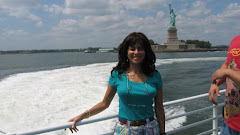Here is a great list (published
October 2012) of indicators you are the UGLY AMERICAN while travelling
abroad. I read this novel a few years
ago and realized these attitudes frustrated me so, they motivated me to launch
my intercultural consulting business: Global Ways.
Bad news, fellow
Americans. The rest of the world thinks were terrible travelers. It's so bad, in
fact, that the term "Ugly American" has become shorthand for any
tourist that sticks out or misbehaves abroad. (Don't blame us, we didn't coin
the phrase.) Read on to see if you fit the stereotype.
Attire
White sneakers, a fanny pack, a baseball hat ... and a Canadian-flag patch sewn onto your backpack. This uniform can make a tourist stand out--and not in a good way. Wear what's comfortable, but do make an effort to blend in with what the locals wear, especially when it comes to covering up in more modest countries. We've also seen many Americans utilize the Canadian flag to pretend they're not from the US while traveling. Don't be ashamed of our country -- be an example of what's good about it. Let your behavior and attitude leave a positive impression when you travel instead of pretending to be from somewhere else.
English Only
We're not saying that you have to be fluent in a country's native language in order to visit it--but you should at least make an effort to learn key phrases and words. Knowing how to say things like "Hello" and "Do you speak English?" in the local language can go a long way. American tourists are notorious for just repeating English questions louder when a nonspeaker doesn't understand, so don't do that. Try to use hand gestures, phrasebooks, or even apps to get your point across instead.
Complaining About Portions
To the rest of the world, it's not just Texas where everything's bigger -- it's America. It doesn't help the stereotype when Americans complain about small portion sizes while dining out abroad. Think of smaller portions as a way to sample more dishes or to reevaluate your own eating choices.
Demanding to Know the Price in Dollars
Attire
White sneakers, a fanny pack, a baseball hat ... and a Canadian-flag patch sewn onto your backpack. This uniform can make a tourist stand out--and not in a good way. Wear what's comfortable, but do make an effort to blend in with what the locals wear, especially when it comes to covering up in more modest countries. We've also seen many Americans utilize the Canadian flag to pretend they're not from the US while traveling. Don't be ashamed of our country -- be an example of what's good about it. Let your behavior and attitude leave a positive impression when you travel instead of pretending to be from somewhere else.
English Only
We're not saying that you have to be fluent in a country's native language in order to visit it--but you should at least make an effort to learn key phrases and words. Knowing how to say things like "Hello" and "Do you speak English?" in the local language can go a long way. American tourists are notorious for just repeating English questions louder when a nonspeaker doesn't understand, so don't do that. Try to use hand gestures, phrasebooks, or even apps to get your point across instead.
Complaining About Portions
To the rest of the world, it's not just Texas where everything's bigger -- it's America. It doesn't help the stereotype when Americans complain about small portion sizes while dining out abroad. Think of smaller portions as a way to sample more dishes or to reevaluate your own eating choices.
Demanding to Know the Price in Dollars
It's fine to do the math in your head or on a calculator, but don't ask a merchant how much their wares are in "real money." Get a rough idea of the conversion rate before you leave and do the mental math instead, or download a currency-converter app for your smartphone. You'll be shopping like a local in no time.
Excessive Patriotism
We can't even count the number of times we've heard a fellow American tourist brag about "how America does it." It's great to discuss cultural differences, but if you're pointing out customs that you think are flawed or not as good as "how we do it here" then you're missing out on the whole idea of travel.
Trying to Recreate America Abroad
You're traveling for a reason--to experience new things! So don't automatically seek out the nearest Starbucks when you're overseas. Sample the local restaurants as well as the cool fast-food chains that we don't have here. Remember that amenities we take for granted (like air-conditioning or Western-style toilets) aren't available everywhere, so be prepared to adjust to a new standard of living temporarily.
Overpacking
Americans have a reputation for being "oversized" abroad, but your luggage doesn't have to be. Overpacking can be a clear indication of an American tourist, so don't struggle up the stairs of your European hotel with a huge suitcase if you don't have to. Downsize to a backpack or small suitcase--if you run out of clothing, you can always go shopping while you're on vacation, and then you'll really look like you belong. Or, do laundry at a Laundromat near your hotel--it's the perfect chance to mingle with locals.
My additions: Make the unfamiliar familiar by learning about the culture in advance. To enhance your experience overseas, I recommend:
Do your homework
Be insatiably curious. Go to
your local bookstore and use the internet to research the other culture’s
history, geography, key symbols, tourist attractions, national dishes, popular
sports, non verbal communication rules, leaders and celebrity culture. Study the local map including the mass
transit or metro map and the area surrounding your hotel. You will feel more comfortable exploring and
communicating when you have gone the extra mile to learn something about your
new culture. The best part is that by
taking an interest in the other culture, your actions will convey genuine
respect. Your efforts will be
appreciated by most (if not all) whom you meet.
It will set you apart from many Americans who don’t bother to learn
something about the other culture.
Remember, people all over the world know U.S.
For a crash course in local customs and etiquette, I recommend the
easy-to-read Culture Shock series. They are compact guides (250 pages) that provide a comprehensive and accurate portrayal of culture in more
than 35 countries, with practical tips on how to be effective there. They are well-researched, authentic, and
entertaining. You can order Culture Shock online from all leading
book sellers.
Actually, a novel about a young American living in Paris France
For example, before traveling to Viet Nam Viet Nam China Viet Nam
In short, the literature and films set in that country enhanced my
total travel experience.
Learn a few commonly
used words and phrases
Rest assured you do not need to enroll in a 3-month immersion
class. Most of the world accommodates
English speaking tourists. In fact, it
is the second most spoken language, behind Mandarin, in the world. Your experience can be greatly enhanced by
showing basic respect. You can
accomplish this by learning some common courtesy expressions such as hello; goodbye; thank you; and please and one of my favorites: “Where are the toilets?” “How
much is that ________?” also comes in very handy when bargaining.
You will be amazed by how instantly connected you feel when upon
arrival, someone says hello in their
language and you can respond in the same language or when they say thank you, you can reply appropriately.
I strongly urge you to refrain from bursting into a conversation
leading with English words. Instead (or
what is more respectful is to) always first ask “Do you speak English?”
You can listen to a basic language tape daily before you go that
provides language basics including numbers,
useful questions, shopping terms, hotel/taxi/ and airport expressions,
and dining phrases.









.jpg)
.jpg)




No comments:
Post a Comment